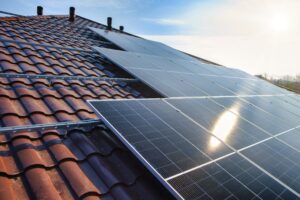Interest in solar panels with battery storage is rising as homeowners strive to cut energy costs and make their contribution to a more sustainable environment.
It is estimated that more than one million UK households now have solar panels. They benefit from lower electricity bills, a reduced carbon footprint, increased property value, and getting paid for excess green energy they generate. Many of these households will also have installed a solar battery to maximise the advantages of solar panels.
But how does solar battery storage work? Is it worth the investment and which type of battery is best? Let’s find out.
What Does a Solar Battery Do?
When you can store energy from solar panels, electricity bills are even lower and your carbon footprint is further reduced. Using a battery alongside solar photovoltaic (PV) panels means your solar energy is not wasted.
Electricity is stored in the battery cell until needed. The battery then generates electricity which can be used when your solar system isn’t generating energy or producing enough to meet your needs at that time.
Without battery storage, households typically are unable to use around 60 to 80% of the electricity generated from solar energy.
Solar panels only produce electricity during daylight, when homes typically use less power. Electricity that isn’t used immediately goes into the national grid. After sunset, when energy demand peaks, electricity has to be imported from the grid.
A solar battery stores surplus solar energy generated during the daytime. You can then use the electricity when you need more power during the evening.
By reducing reliance on the grid in this way, a solar panel system with battery storage can cut electricity bills by up to 90% – 20% more than solar panels on their own.
Solar batteries are highly efficient. They charge quickly, storing large amounts of electricity. With a higher capacity than normal batteries, a solar battery builds up more energy that can be used for longer periods of time.
- Create a Tailored Quote Based On Your Circumstances
- Takes Less Than 2 Minutes
- Fixed-Online Quotes

Types of Solar Batteries
Two types of solar batteries are widely used in homes: lithium-ion and lead-acid. They both work by storing a charge and releasing electrons through an electrochemical process. Other types of solar batteries include nickel-based batteries and flow batteries.
Lithium-Ion Solar Battery
Lithium-ion (li-ion) solar batteries are the most popular option for households. They store a substantial amount of energy more reliably and with greater efficiency than lead-acid batteries.
Li-ion batteries cost more but last longer and provide a better energy storage solution for everyday residential use. They take up little space and last 10 to 20 years with minimal maintenance.
Lead-Acid Solar Battery
Although cheaper than lithium-ion batteries, lead-acid solar batteries don’t last as long and are less efficient and less reliable. They may, though, be a good choice as a small off-grid energy storage system that isn’t used often.
Nickel-Based Solar Battery
Nickel-based solar batteries aren’t widely used with residential solar panels because of the slow rate of charging and discharging. This makes it difficult for them to become fully charged during the day and release all the electricity during peak times of energy use.
Flow Battery
Flow batteries are a new type of solar battery, based on decades of research and development.They have a long lifespan and a unique design currently suitable for industrial-scale energy storage. Flow battery systems are weighty and need storage tanks that take up a lot of space.
Lithium-Ion Battery Vs Lead-Acid Battery
Because the most popular types of domestic solar batteries are lithium-Ion batteries and lead-acid batteries, it’s worth comparing the two in a little more detail. According to solar industry professionals, a lithium-ion battery is almost always the better, more cost-effective option, despite being more expensive.
Efficiency
Battery efficiency – the amount of stored energy that can be used – is a crucial factor when considering solar battery types. Lithium-ion batteries typically achieve 95% or more efficiency. This compares with lead-acid battery efficiencies of around 80 to 85%.
Durability
The shorter lifespan of lead-acid batteries means you may need to buy two of them to last as long as one lithium-ion battery.
- Create a Tailored Quote Based On Your Circumstances
- Takes Less Than 2 Minutes
- Fixed-Online Quotes

Where Are Solar Batteries Installed?
Solar batteries are typically installed inside a property because they work best at room temperature and need protection from adverse weather. Ideally, they should be as close as possible to your home’s electrical consumer unit – the modern version of outdated fuse boxes. This facilitates monitoring the energy coming into and going out of your home.
Modern solar batteries are sleek and are often placed in a utility room or understairs cupboard. If that’s not practical they can be installed in a garage or loft.
Wherever your battery is installed, it needs good airflow. Ventilation helps the battery run smoothly and prevents it from getting too warm.
Your solar battery should also be easily accessible for maintenance. For safety reasons, it shouldn’t be placed near flammable objects or materials. If a solar battery is installed outside, it needs to be in a location protected from moisture, rain and wind.
What Size Solar Battery Do I Need?
Solar battery size doesn’t relate to the battery’s physical dimensions. It’s based on how much energy it can store (capacity). While power output of solar batteries is measured in kilowatts (kW), the energy storage capacity refers to kilowatt hours (kWh).
The size of solar battery capacity you need depends on how much electricity your home uses. The larger the household, the greater the battery storage capacity you need.
- Households with one to two people typically need a solar battery up to 10.5kWh.
- Household with two to three people –11kWh to 12kWh battery.
- Household of three to four people – 13kWh to 20kWh battery.
- Household of four to five people – 21 kWh to 31kWh battery.
- Household of five or more people – 31kWh-plus battery.
Solar Battery Costs
Solar battery prices range from around £3,500 to £10,000 or more. Estimated prices for different sizes of batteries are as follows.
- A 4kWh to 5kWh battery with a 2kW solar panel system (costing £5,000 to £6,000) adds £3,500 to £5,000 to the price. Total cost: £8,500 to £11,000.
- A 6kWh to 7kWh battery for a £7,000-£8,000 3kW solar panel system costs £5,000 to £8,000. Total cost: £12,000 to £16,000.
- A 9kWh to 10kWh battery for a £9,000-£10,000 4kW solar panel system costs £8,000 to £9,500. Total cost: £17,000 to £19,500.
- An 11kWh to 12kWh battery for an £11,000-£12,000 5kW solar panel system costs £9,000 to £10,000. Total cost: £20,000 to £22,000.
- A 13kWh to 14kWh battery for a £12,000-£13,000 6kW solar panel system costs £10,000-plus. Total cost: Upwards of £22,000 to £23,000.
As solar panels continue to become more accessible and affordable, solar batteries are also expected to come down in price.
Solar Battery Savings
Combining battery storage with solar panels results in improved energy management with annual cost savings of several hundred pounds or more.
By further reducing dependency on the grid, solar batteries can save on average around £800 a year, depending on the size of the solar array and the storage capacity of the battery.
Potential annual savings of a solar panel system with battery storage are as follows.
- £515 with a 2kW to 3kW solar panel system for a one- to two-bedroom home.
- £770 with a 3kW to 4kW solar panel system for a two- to three-bedroom home.
- £1,175 with a 6kW solar panel system for a four- to five-bedroom home.
Benefits of Solar Battery Storage
Renewable energy provided by solar panels and solar batteries is becoming increasingly popular because of its environmental and economic benefits. Solar battery storage enhances the advantages of solar panels by storing surplus energy generated during the day for use at night or when solar power generation is low.
Besides significant savings on energy bills and providing backup power during mains supply outages, solar batteries improve overall energy efficiency and independence. They further reduce carbon emissions produced by generating electricity with fossil fuels such as coal, oil and natural gas. This lessens environmental impact and contributes to a more sustainable, greener future.
Solar batteries are designed for durability, with long-term savings on energy costs. They generally come with a 10-year warranty but can last up to 15 years, paying for themselves after 10 to 12 years.
Do Solar Batteries Have Any Disadvantages?
One drawback of solar batteries is the high cost. The initial investment in battery installation can be significant and the expense of larger systems may not be worthwhile for some households.
Solar batteries also need regular upkeep to guarantee optimal performance and lifespan. This includes maintenance checks and monitoring charge levels.
However, many homeowners have found that the advantages of solar battery storage outweigh potential drawbacks. Solar batteries immediately reduce the carbon emissions that drive climate change and will eventually pay for themselves through long-term savings on energy bills.
Zero VAT on Solar Batteries
The government has underpinned its commitment to green energy by scrapping VAT on both solar panels and solar batteries.
The standard rate of value added tax for goods and services is 20%. VAT on residential solar panels was originally reduced to five percent but became zero-rated in April 2022.
However, zero-rated VAT was only available for solar batteries installed as part of a new solar panel system. That meant you still had to pay 20% VAT on solar batteries that weren’t bought at the same time as your solar panels. Now, from February 2024, VAT is no longer charged on residential solar batteries that are added to an existing solar panel system.
Zero VAT is expected to apply to solar panels and solar batteries until the end of March 2027.
Solar Batteries and the Smart Export Guarantee
As well as saving energy for later use, you can use solar battery storage to sell excess electricity back to the grid through the Smart Export Guarantee (SEG).
Under this government-backed initiative, major energy suppliers offer varying tariffs for each unit of renewable electricity households send back to the grid.
Finding a deal at the higher end of the payment scale could result in energy cost savings of more than £600 a year, depending on the size of your solar panel system.
SEG tariffs of 15p a kilowatt hour, for instance, can result in annual earnings of around:
- £640 with a 7kW solar energy system.
- £540 with a 6kW system.
- £440 with a 5kW system.
- £340 with a 4kW system.
- £240 with a 3kW system.
Some energy providers offer special deals for renewable electricity exported from solar battery storage systems. These packages may be limited to batteries of specific brands.
You can still get Smart Export Guarantee payments if you had a government grant to install your solar panel system. The schemes are separate.
Solar Installation Grants
With prices of battery-supported solar panel systems ranging from £8,500 to more than £20,000, government grants are available to reduce installation costs for some householders.
Energy Company Obligation Scheme
The main source of solar installation grants is the Energy Company Obligation Scheme in England, Scotland and Wales.
The £4 billion fourth and final phase of the initiative – ECO4 – was launched in 2022. It’s open to households receiving a means-tested benefit whose home has a low Energy Performance Certificate (EPC) rating – E, F or G.
You can apply for an ECO4 solar grant if you or someone else in your household gets a benefit such as:
- Income Based Jobseekers Allowance
- Universal Credit.
- Income Support.
- Income-related Employment and Support Allowance.
- Housing Benefit
- Child Tax Credit.
- Working Tax Credit.
- Pension Credit.
ECO4 can cover part or all of the cost of a solar installation. It’s scheduled to close in 2026. But it could end sooner if the money runs out as energy suppliers meet their funding obligations.
ECO4 LA Flex
ECO4 LA Flex enables local councils to make Energy Company Obligation funding available to more people. In some cases, it can cover the entire cost of installing a solar energy system.
Local Authority Flexible Eligibility widens ECO4 to include households not claiming a means-tested benefits. Each local authority tailors its ECO4 Flex funding to reflect the energy efficiency needs of its community.
Although eligibility conditions may vary among councils, ECO4 LA Flex grants are in general available to households with an income less than £31,000 a year and struggling to heat their home.
Home Upgrade Grant
Like ECO4 LA Flex, the £700 million Home Upgrade Grant (HUG) offers solar funding to households with a combined annual income of £31,000 or less.
However, the scheme is only open to homeowners in certain postcode areas of England off the gas grid. The government will provide local councils with HUG funding until March 2025.
Effective Home Solar Battery Storage Solutions
Solar battery storage gives you more power when you need it most. This results in long-term savings as you rely less on mains electricity.
When installed and maintained by a professional, a solar battery is one of the safest home electrical devices.Teams of renewable energy specialists from leading solar panel and battery provider Effective Home have been installing solar energy systems for homes since 2008.
We’ve helped thousands of households optimise the environmental and financial advantages of solar panels with a quality solar battery.
Whether you’re looking to incorporate a battery in a new solar panel installation or want to add a battery to an existing system, we can help.We offer free home surveys and custom solar panel and battery installation plans to future-proof your home’s energy needs.
Our solar panels come with a 25-year warranty and solar batteries with a 10-year warranty. Contact us if you’d like to know more about how solar battery storage works and the benefits you can expect from it.
- Create a Tailored Quote Based On Your Circumstances
- Takes Less Than 2 Minutes
- Fixed-Online Quotes




